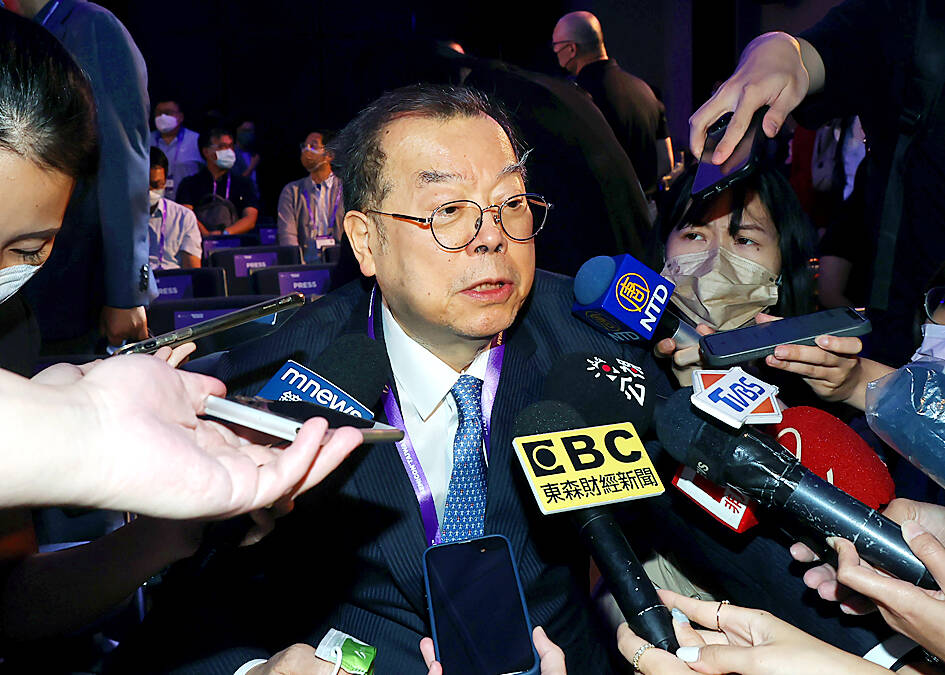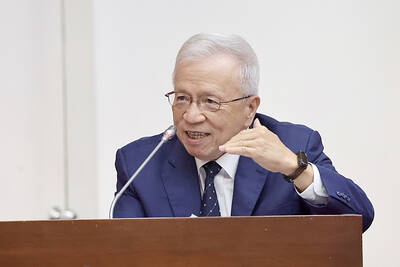As Taiwan plays a key role in global supply chains, local semiconductor companies should be cautious in responding to US plans to further curb exports of advanced chips to China, Powerchip Semiconductor Manufacturing Corp (力積電) chairman Frank Huang (黃崇仁) said yesterday.
Huang’s comments came in the wake of media reports that US President Joe Biden’s administration is considering broadening its ban on US exports of artificial intelligence chips and semiconductor equipment to China, aiming to obstruct Beijing’s progress in enhancing its chip development and manufacturing capabilities.
“The whole world needs chip supply from Taiwan. The supply chain cannot be disrupted abruptly,” Huang said. “Besides, Taiwan maintains a complementary relationship with China.”

Photo: CNA
Taiwanese manufacturers such as Quanta Computer Inc (廣達電腦) and Wistron Corp (緯創) assemble computers in China, but the chips they use are from Taiwan, he said.
Likewise, Apple Inc purchases Taiwan-made chips to manufacture iPhones in China, he added.
The US restrictions would have a mixed impact on Taiwanese companies, Huang said.
Taiwanese firms would obey US rules and its curbs on shipping advanced chips and sensitive technologies to China, but they would need a grace period of a year to seek alternative solutions, he said.
Under such a complex geopolitical environment, Taiwanese companies should carefully evaluate the pros and cons before making a decision and find solutions to prevent supply chain disruptions, he said.
Commenting on the latest inventory-driven semiconductor slowdown, Huang said investors have “overly reacted” to the ups and downs of the industry.
Semiconductor demand has come down from a peak driven by strong demand for PCs to cope with new work and lifestyles due to the COVID-19 pandemic in the past two to three years, he said.
Powerchip shares have tumbled amid a spate of corporate warnings about slowing demand for chips. The stock yesterday ended down 1.25 percent at NT$31.60 in Taipei trading.
The company, which makes power management ICs, dismissed the rumors, saying that most customers were adjusting their inventories.
Powerchip’s revenue surged about 40 percent to NT$55.71 billion (US$1.79 billion) in the first eight months of the year, compared with NT$39.82 billion in the same period last year.
The semiconductor industry would experience a mild recovery after supply chain inventory drops to a reasonable level through December and a brief dip caused by surging inflation, Huang said, adding that he was confident about the local semiconductor industry’s long-term prospects.
The production value of the local semiconductor industry surpassed NT$4 trillion for the first time last year, rising 26.7 percent from a year earlier to NT$4.1 trillion, Vice Premier Shen Jong-chin (沈榮津) said yesterday at the opening ceremony of the Semicon Taiwan trade show at the Taipei Nangang Exhibition Center’s Hall 1.
Taiwan has played a critical role in the global semiconductor industry on the back of a well-built industry cluster and its lead in advanced processes, Shen said.

JITTERS: Nexperia has a 20 percent market share for chips powering simpler features such as window controls, and changing supply chains could take years European carmakers are looking into ways to scratch components made with parts from China, spooked by deepening geopolitical spats playing out through chipmaker Nexperia BV and Beijing’s export controls on rare earths. To protect operations from trade ructions, several automakers are pushing major suppliers to find permanent alternatives to Chinese semiconductors, people familiar with the matter said. The industry is considering broader changes to its supply chain to adapt to shifting geopolitics, Europe’s main suppliers lobby CLEPA head Matthias Zink said. “We had some indications already — questions like: ‘How can you supply me without this dependency on China?’” Zink, who also

At least US$50 million for the freedom of an Emirati sheikh: That is the king’s ransom paid two weeks ago to militants linked to al-Qaeda who are pushing to topple the Malian government and impose Islamic law. Alongside a crippling fuel blockade, the Group for the Support of Islam and Muslims (JNIM) has made kidnapping wealthy foreigners for a ransom a pillar of its strategy of “economic jihad.” Its goal: Oust the junta, which has struggled to contain Mali’s decade-long insurgency since taking power following back-to-back coups in 2020 and 2021, by scaring away investors and paralyzing the west African country’s economy.

BUST FEARS: While a KMT legislator asked if an AI bubble could affect Taiwan, the DGBAS minister said the sector appears on track to continue growing The local property market has cooled down moderately following a series of credit control measures designed to contain speculation, the central bank said yesterday, while remaining tight-lipped about potential rule relaxations. Lawmakers in a meeting of the legislature’s Finance Committee voiced concerns to central bank officials that the credit control measures have adversely affected the government’s tax income and small and medium-sized property developers, with limited positive effects. Housing prices have been climbing since 2016, even when the central bank imposed its first set of control measures in 2020, Chinese Nationalist Party (KMT) Legislator Lo Ting-wei (羅廷瑋) said. “Since the second half of

AI BOOST: Next year, the cloud and networking product business is expected to remain a key revenue pillar for the company, Hon Hai chairman Young Liu said Manufacturing giant Hon Hai Precision Industry Co (鴻海精密) yesterday posted its best third-quarter profit in the company’s history, backed by strong demand for artificial intelligence (AI) servers. Net profit expanded 17 percent annually to NT$57.67 billion (US$1.86 billion) from NT$44.36 billion, the company said. On a quarterly basis, net profit soared 30 percent from NT$44.36 billion, it said. Hon Hai, which is Apple Inc’s primary iPhone assembler and makes servers powered by Nvidia Corp’s AI accelerators, said earnings per share expanded to NT$4.15 from NT$3.55 a year earlier and NT$3.19 in the second quarter. Gross margin improved to 6.35 percent,